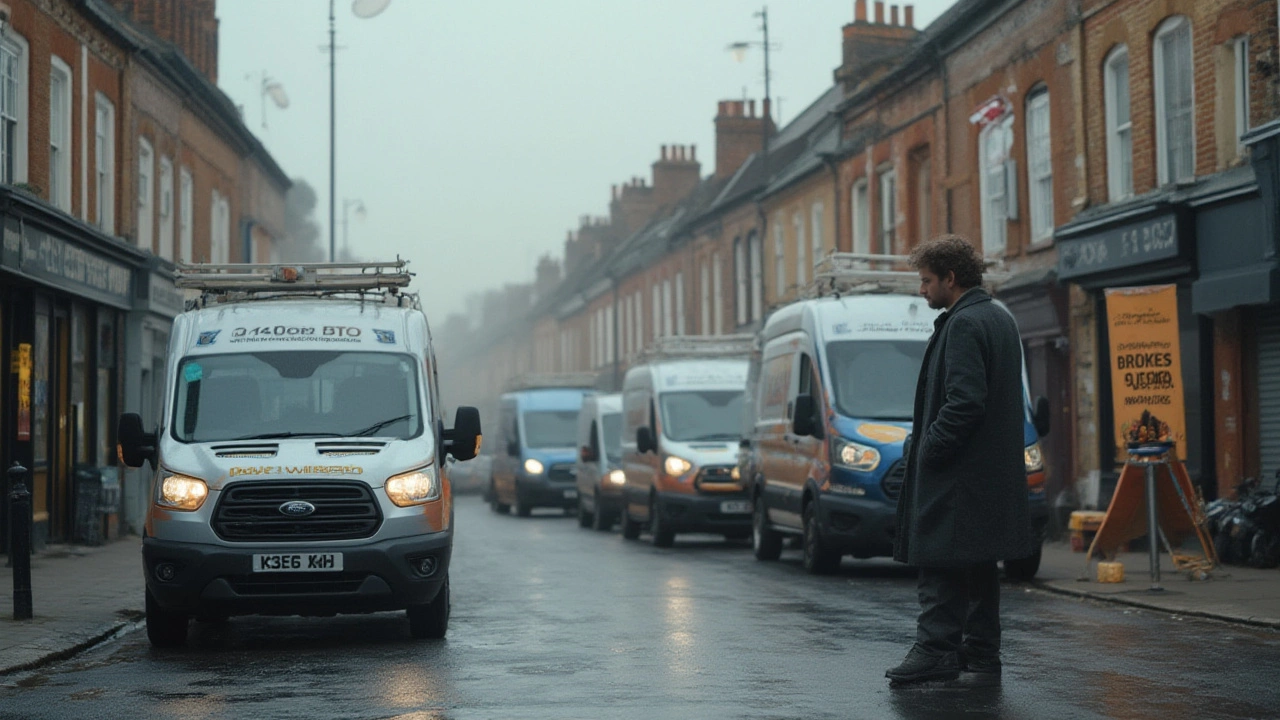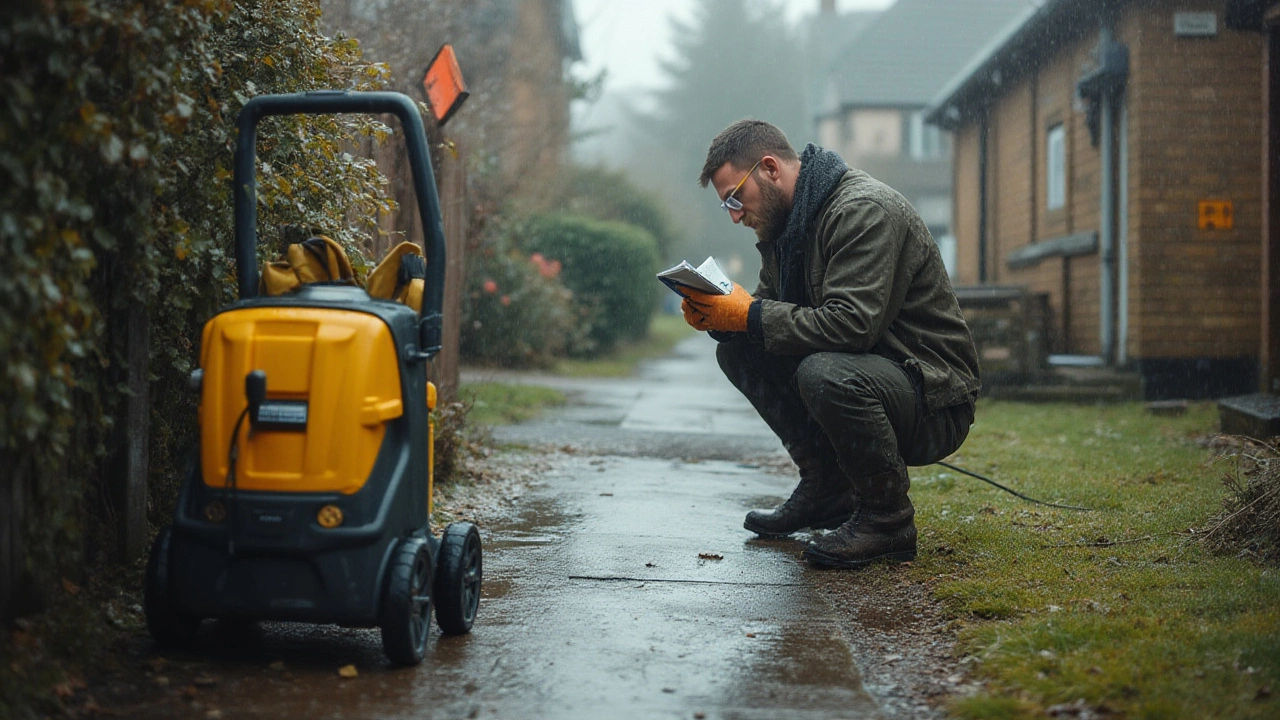Ever thought you could just buy a jet washer, print a few leaflets, and start raking in quid cleaning driveways and patios around Bristol? Loads of people have the same idea, especially when your social feed is packed with satisfying before-and-afters. But there’s a lot lurking beneath a shiny surface. Some parts of the job could leave you skint or even injured, if you aren’t careful. So, if you want to avoid a business headache—and possibly an A&E visit—let’s unpack all the real risks of starting your own pressure washing business.
Accidents and Safety Risks: The Hidden Dangers of High Pressure
Pressure washers don’t look scary, right? But the numbers tell a different story. The NHS reported over 2,400 pressure washer injuries in the UK in just one year between 2022-2023. These machines easily blast water at 1,500 to 4,000 psi—in plain English, that’ll strip paint, dirt, skin, and sometimes even fingers, if you get cocky or distracted for two seconds. One wrong move and you could puncture your foot right through your trainers, or accidentally carve a hole in someone’s wooden shed (explain that to a customer who just wanted their decking cleaned).
It’s not just lacerations. Water under high pressure can inject bacteria and dirt deep under the skin. That means a tiny pinprick injury from a pressure washer nozzle could result in a nasty infection or even sepsis. The Health and Safety Executive (HSE) library lists multiple cases where staff lost time and money from pressure washer injuries, and it’s always the small lapses—like forgetting gloves, ignoring proper boots, or using a frayed hose.
Then there's the risk of falls. Wet surfaces get extremely slippery, especially on mossy or algae-covered driveways. According to a 2024 report from RoSPA (Royal Society for the Prevention of Accidents), slip-and-trip incidents from outdoor cleaning jobs rank in the top five causes of small business insurance claims.
If that’s not enough, consider electrical risks. Many pressure washers use mains power. With water everywhere, a dodgy extension cable, or improper earthing could mean you’re one squelchy puddle away from a shock. Portable generator setups have their own perils, including carbon monoxide poisoning if used in garages or enclosed spaces. Not to mention flying debris—from chipped brick or shrapnel under that stubborn bit of moss flipping right into your eye if you don’t wear proper goggles.
It might sound dramatic, but safety really should be your religion here. Invest in steel-toe boots, proper gloves, safety goggles, and ear protection (some machines are as loud as a small motorbike). Don’t cheap out—quality PPE can mean the difference between a busy weekend and a month off work recovering.
Legal Trouble: Permits, Claims, and Compliance Headaches
If you thought you could skip the boring paperwork, think again. Most likely, you’ll need a waste water licence if you ever let chemicals or dirty runoff go into storm drains. The Environment Agency handed out hundreds of £1000+ fines in 2023 to small outdoor cleaning services caught dumping untreated water. If you’re using anything other than clean water, you’re on their radar.
Ever heard of COSHH? It stands for Control of Substances Hazardous to Health. If you’re slapping on any kind of chemical (think patio cleaners, fungicides, or degreasers), you’re required by law to store, use, and dispose of these safely. That means reading the safety data sheets, keeping everything properly labelled, and having spill kits for emergencies. Inspectors don’t accept “I didn’t know” as an excuse—if they catch you, fines aren’t cheap, and they can even shut you down for serious breaches.
Let’s talk insurance. You’re legally on the hook if you damage someone’s property (which can happen in seconds if you catch a hose on a customer’s luxury garden lighting). Public liability insurance isn’t technically required by law for everyone, but if you skip it, you’re playing roulette with your bank account. One compensation claim after flooding a basement—or shattering someone’s beloved double-glazed French doors—can wipe out months or years of your profits. In 2024, the average property damage claim paid by small service business insurers in the UK was £3,240. Worth the £10/month premium? You decide.
And don’t get me started on working at height. A lot of roof cleaning jobs sound lucrative but require compliant ladders, scaffolding, or cherry pickers. If you take on work without the proper gear or training, you could be breaking HSE regulations and invalidating your insurance. Quick tip: log every job, record your safety checks, and keep up to date on training. Customers check your certificates more now—they don’t want cowboys.
To make things more concrete, here's a breakdown of common legal risks and recommended mitigation steps:
| Legal Risk | Potential Cost | How to Reduce Risk |
|---|---|---|
| Unlicensed chemical runoff | £1,000–£5,000 fines | Get permits, use soakaways, never drain to storm sewers |
| Property damage claims | £200–£10,000+ | Public liability insurance, method statements |
| Work at height violations | Stop-work order, fines, jail time | Certified access equipment, training |
| COSHH breach | £500–£2,000 fines | Proper chemical handling, recordkeeping |

Cashflow Crunch: The Money Pit No One Talks About
Here’s the uncomfortable bit: most new businesses don’t make money for a while. Pressure washing is seasonal in the UK. Winter is dead slow—rain, frost, and dark evenings kill demand fast. Even in summer, competition is fierce. A quick browse on Facebook Marketplace or Gumtree shows dozens of lads with a pressure washer ready to undercut you by twenty quid for a patio job. That’s why rates tend to race to the bottom if you haven’t picked a niche or built a killer reputation.
The real start-up costs are often higher than you expect. A reliable pro-grade pressure washer like a Honda-powered unit is £900-£1,800—not your average B&Q special. You’ll want backup nozzles, hoses, and a decent van or trailer. Don’t forget fuel, oil, and tool upkeep. Add PPE, business insurance, branded clothing, and at least a couple of hundred for marketing materials (flyers, signage, social posts, maybe even a basic website with online booking). By the time you’ve ticked every box, you could have spent £3,000 or more before you’ve earned your first quid.
But wait, there’s more: chasing up payment is a full-time job itself. Many clients expect to pay by invoice, and delays happen. A UK study from Simply Business in April 2024 found that 37% of home service SME’s experienced late payments as their number one business risk. Unpaid invoices can mean you struggle to buy supplies for your next job or invest in repairs when your pressure washer breaks (and it will… usually at the worst time).
Think about transport, too. Older vans can eat through savings with breakdowns and high fuel bills. Council parking fines for parking on double yellows or grass verges in residential areas are a real thing—Bristol City Council issued 2,700 fines just for improper trader parking in 2023. That’s more cash gone if you don’t plan your stops carefully.
Some people try to save money by working cash-in-hand or skipping insurance. Sounds tempting. But if someone gets hurt or you damage property, you could lose everything overnight—not worth the risk, honestly. Put proper financial systems in place: use simple accounting apps, keep receipts, invoice every client the same day you finish a job, and chase up payments before you run out of petrol.
Dealing With Difficult Customers and Reputation Risks
A lot of blokes don’t fully realise it’s a customer service gig, not just manual labour. Most people hiring a pressure washing service are very attached to their garden, patio, or driveway—and they have picky standards. If you miss a weed, leave muddy footprints on the grass, or spray water onto the neighbour’s car, expect drama. Poor communication is the number one cause of bad reviews for pressure washing services on sites like Trustpilot and Checkatrade.
Unrealistic expectations can ruin your day. Customers sometimes want ancient flagstones looking like showroom pieces, or for 20 years of oil stains to vanish completely. If you don’t manage expectations from the get-go, you’ll get complaints and possibly demands for refunds. All it takes is one unhappy customer to tank your Facebook ratings and put off potential business. In 2025, 52% of UK customers say they will not hire a service with less than four stars on Google or Facebook—one bad week could hurt for months.
Cancellations and ‘no-shows’ eat up profits, too. It’s not rare to show up for a job only for nobody to answer the door, or for the customer to have found someone 'cheaper' at the last minute. No-shows represent up to a third of daily bookings for startups in the pressure washing trade, according to a 2024 Pulse survey of 300 Bristol-area services.
Handling disputes calmly and professionally is a skill you’ll need to learn fast. Document every job—take 'before and after' photos, get the client’s sign-off, and keep detailed notes. This saves your skin if someone tries to claim you scratched a window or killed a prize rosebush (when you know it was already on its last legs!).
Your rep is your most valuable asset. Be polite, show up when you say you’ll show up, and fix small issues before they turn into public complaints. Ask happy customers for honest reviews—don’t pay for fake reviews, it fines are hefty and your real clients will smell a rat. If you mess up, admit it and make it right—this actually builds trust faster than pretending you’re flawless.

Environmental, Regulatory, and Community Challenges
It isn’t all just mopping driveways and smiling for social media. The trend in environmental regulations is only getting stricter. Clean washing water that’s loaded with mud, chemicals, or algae spores is seen as a pollution hazard. Anyone letting this run down public drains risks both a fine and their business reputation. Bristol City Council started a campaign in early 2025 warning trade cleaners against 'dirty drains' with spot checks across the city. Since March, a dozen businesses received warning notices.
Many older properties have clay pipes that clog easily. Excess dirt or debris you flush into a customer’s system could cause a sewage backup—not just a major mess but a bill you’re responsible for. Plenty of customers live in conservation areas or own listed properties where there are rules about using pressure washing on stonework, brick, or traditional materials. If you don’t check for local restrictions first, you might get caught in a council dispute or face a stern letter from a heritage officer.
On the community front, neighbours love a tidy street but hate noise. Pressure washers aren’t quiet. In England, the Control of Pollution Act 1974 lets local councils slap you with a 'noise abatement notice' if a neighbour complains and you’re over the legal sparrow-fart start time or late into the evening. Fines aren’t tiny either—£500+ per breach isn’t rare. So, don’t ignore those “quiet neighbourhood” signs.
Then there’s the future: plenty of people are worried about microplastics and runoff from plastic driveways or chemically treated surfaces. Firms that go green—with eco-friendly detergents and water-recapture systems—are scoring more contracts with schools, councils, and high-end home estates. Staying ahead of the curve will earn you steady work when regulations tighten. Training with environmental guidelines might mean an extra weekend or two in a classroom, but it could pay off by setting you apart from the competition.
So, if you’re serious about starting up, take all these risks seriously—learn the local and national laws, buy the right insurance, spend a little extra on safety, and treat every customer like they’re your first and last. Pressure washing can be a solid earner if you don’t rush or cut corners. The big payoff comes to those who do it by the book—and fix their mistakes fast when things don’t go to plan.
